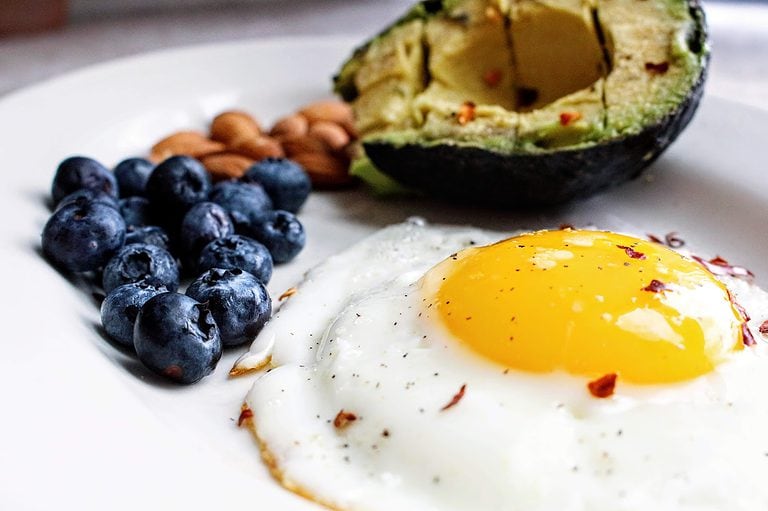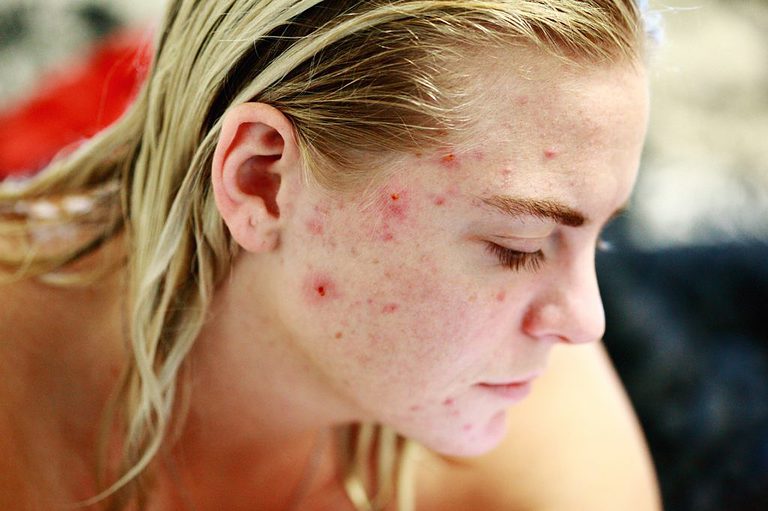One of the most common symptoms of polycystic ovarian syndrome (PCOS) is unwanted hair growth. This is due to the high androgen levels such as testosterone contributing to this undesirable high growth on places like a chin, belly, face, arms or back.
Many women that I see with PCOS try everything that they can to remove this hair whether it be waxing, shaving or expensive laser hair removal. However, many do not know that changes to diet and lifestyle can help get to the root cause (no pun intended) of this pesky excess hair growth!
Here are three tips that can help reduce your androgen levels and take charge of hair growth!
1. Spearmint Tea
Did you know that spearmint herbal tea has been shown to reduce androgen levels in women with PCOS?
A randomised controlled trial found that women who were randomly allocated to drink spearmint tea twice a day for a month had significantly reduced free and total testosterone levels. Spearmint tea also increased LH and FSH and the women allocated to drink spearmint tea rated their hair growth as reduced over the thirty days (Grant, 2010).
But, there was not a significant decrease in the objective ratings of hair growth, suggesting the study was not long enough (Grant, 2010).
Another five-day study found that 12 women with PCOS, nine of which had facial hair, were given two cups of spearmint tea a day during the follicular phase (first half) of the menstrual cycle. As a result, testosterone levels were reduced (Akdoğan et al., 2007).
2. Managing androgen levels through blood glucose control
As we know, unwanted hair growth is a symptom that women with PCOS experience due to increased androgen levels. One way to manage androgen levels can be through managing blood glucose levels and insulin resistance.
Read more about eating for insulin resistance here.
Insulin refers to the signal released from the body after eating foods containing glucose (sugar). It tells your body to remove glucose from the bloodstream and put it in the cells for energy and do work like fuel your muscles and your brain!
Insulin resistance occurs when there is either not enough insulin or the body is unable to respond to the insulin being produced, leaving the glucose trapped in the bloodstream leading to rising blood sugar levels and a craving to eat more foods rich in glucose (think carbohydrates and sweets) to get the much-needed energy that your cells are lacking!
Improving blood glucose control and reducing insulin resistance can help women with PCOS improve their hormone balance and as a result, reduce symptoms such as hair growth (Baptiste et al., 2010).
People often claim that one way to help you manage your blood glucose levels is by saying goodbye to carbs. But let’s be honest – Give up carbs? Over my bread body!
You can, however, improve blood glucose control through making simple swaps to lower GI carbs such as going from:
- White bread → whole-grain bread
- Jasmine rice → Basmati or Doongara/Clever rice
- Highly processed breakfast cereals → porridge, oats or natural untoasted muesli
Other lifestyle changes that can help manage insulin resistance and blood glucose control include:
- Regular exercise: something as simple as walking is shown to be beneficial. If you already exercise often, incorporating a mixture of aerobic and resistance training is shown to be best for improving insulin sensitivity (getting the body to better respond to the insulin signal.
- Get enough sleep: around 7-9 hours is shown to be ideal
- Add soluble fibre to your diet: some examples include apples, oats, legumes, psyllium husks. Soluble fibre has been shown to improve blood glucose control and assist in appetite control
- Chill out: Find out what helps YOU best destress. Whether it be meditation, a scenic walk or bubble bath.
Want to take charge of your PCOS symptoms?
Learn key dietary and lifestyle strategies to tackle PCOS
Mangange insulin resistance, reduce pesky acne and chin hairs, and regulate your period!
100% Online Course designed by an expert PCOS dietitian and nutritionist
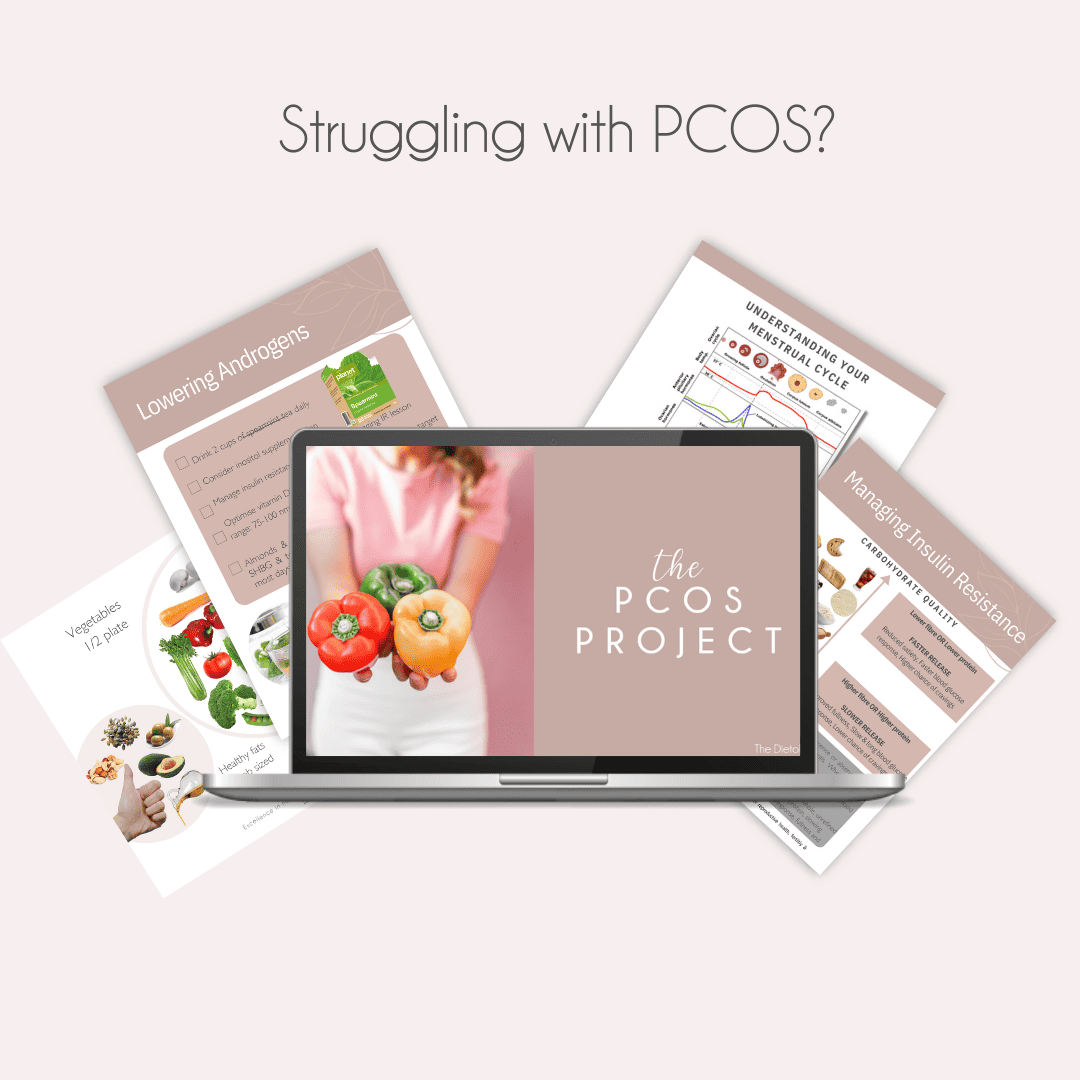
3. Inositol
If you’ve had a read of my previous blog, Does Inositol Help with PCOS, you would remember that Inositol has been dubbed “the natural metformin”. Inositol is a popular, B-like vitamin supplement used by many women with PCOS to help manage their symptoms. Inositol has been found to help manage insulin resistance and stabilise blood sugar levels in women with PCOS.
Whilst dietitians are advocates for getting our nutrients from food (inositol can be found in beans, fruit, whole grains and nuts), supplement form is an easier way to make sure that you are getting the exact controlled dose.
Some other blogs that you might want to check out include Eating for PCOS and Eating for PCOS Part 2
Have you been diagnosed with PCOS? Take control of your PCOS rather than letting it take control of you! Introducing…The PCOS Project
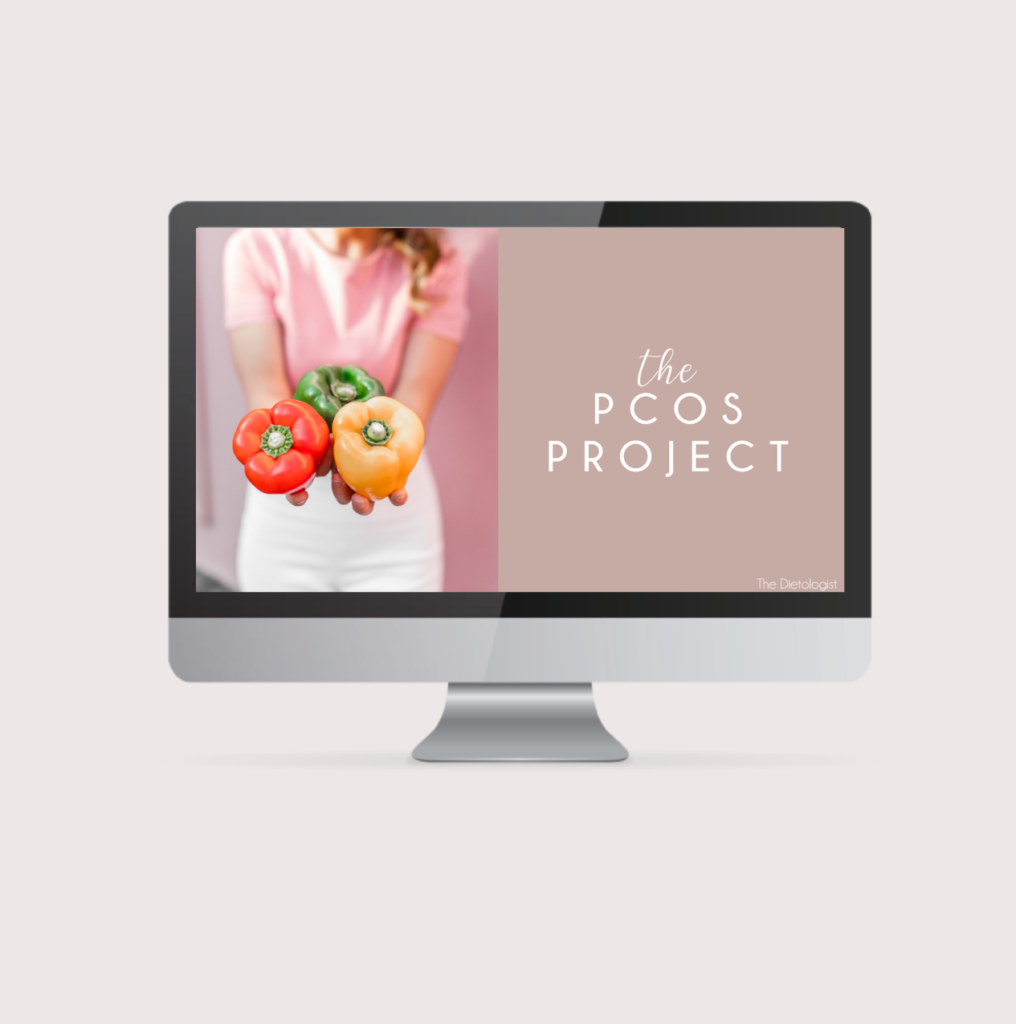
This self-paced online course has been developed to highlight the role of diet and nutrition in managing your PCOS symptoms and taking control of the rollercoaster that is PCOS with 10 comprehensive PCOS-specific nutrition lessons. We also include BONUS PCOS-friendly 7-day meal plans and recipes! Check it out ?
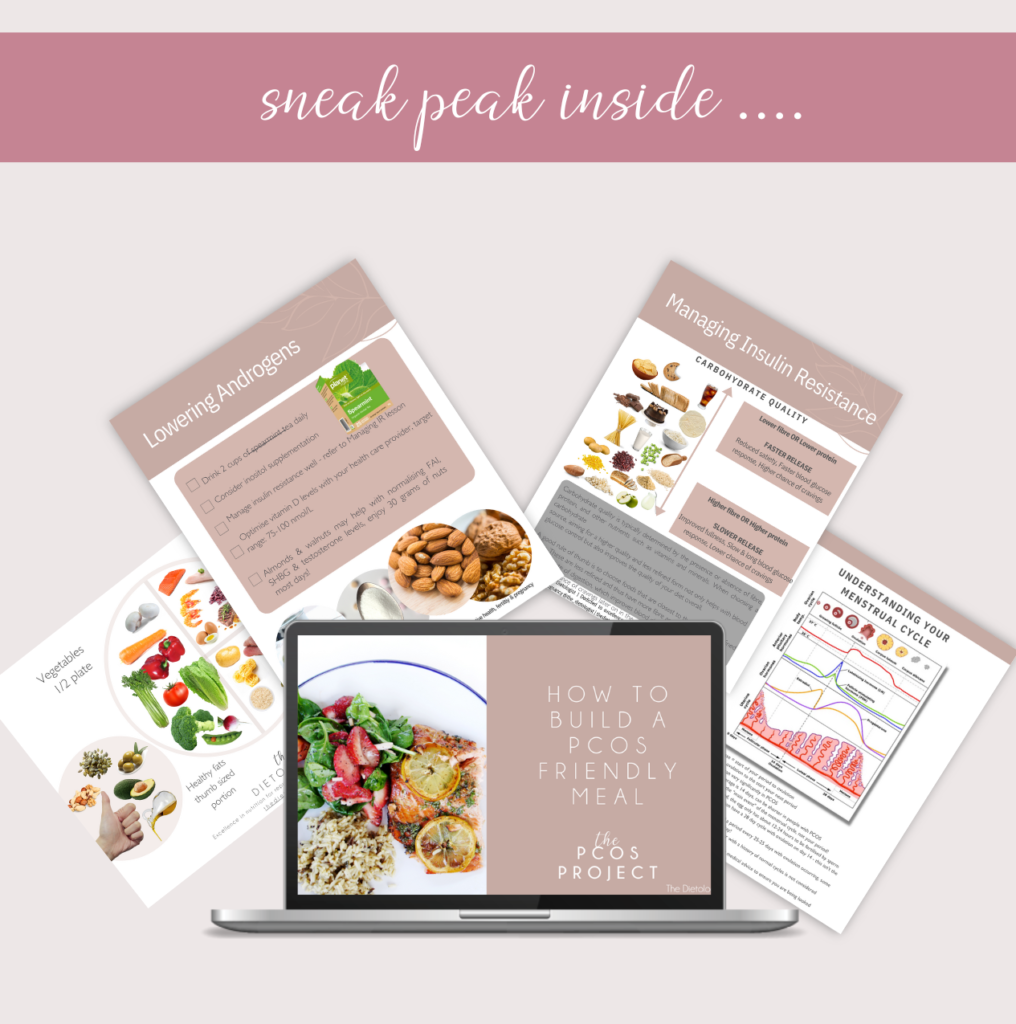
What you’ll get inside The PCOS Project:
- Over 10 comprehensive PCOS-specific nutrition lessons designed & delivered by expert reproductive health dietitian & nutritionist
- Learn exactly what bloodwork you need to monitor your PCOS today and in the long-term too!
- Take control of insulin resistance and stubborn weight using the insulin resistance lesson & comprehensive workbook
- Our strategies to lower androgens driving those pesky pimples & chin hairs!
- Understand your menstrual cycle, the ways you can track it, what the “red flags” are for more help and how to nourish yourself for more regular periods!
- PLUS: supplementation considerations for PCOS (note: does not include personalised supplementary advice), mood & food for mental health, anti-inflammatory eating for PCOS, optimising gut health & how to build a PCOS-friendly meal
BONUS: PCOS-friendly done-for-you 7-day meal plans with recipes AND additional recipe resources!
You will get 2 YEARS to access this incredible VAULT of expertly crafted & delivered PCOS education.
This blog was co-written by Jessica Perrone, a final year Master of Nutrition and Dietetics student at The University of Sydney. You can find Jess on Instagram @nutritionby_jessperrone and on LinkedIn.


